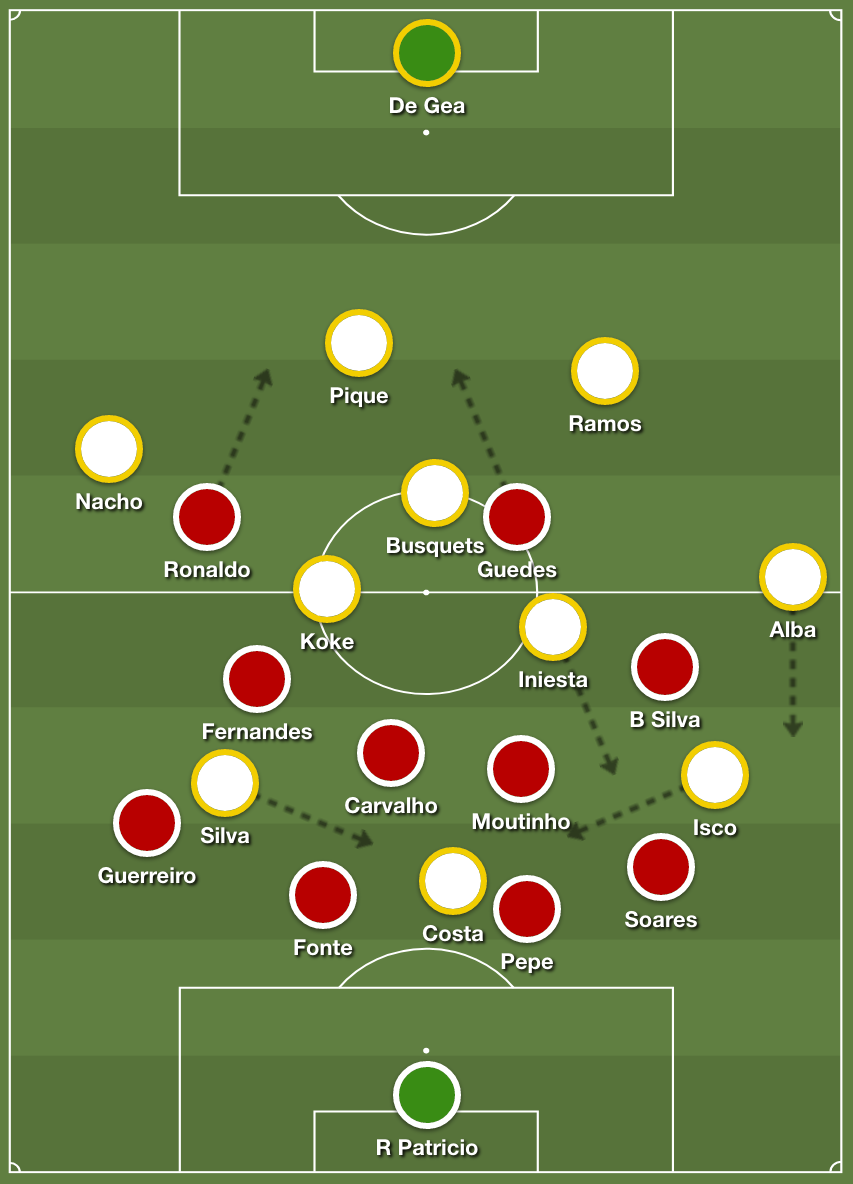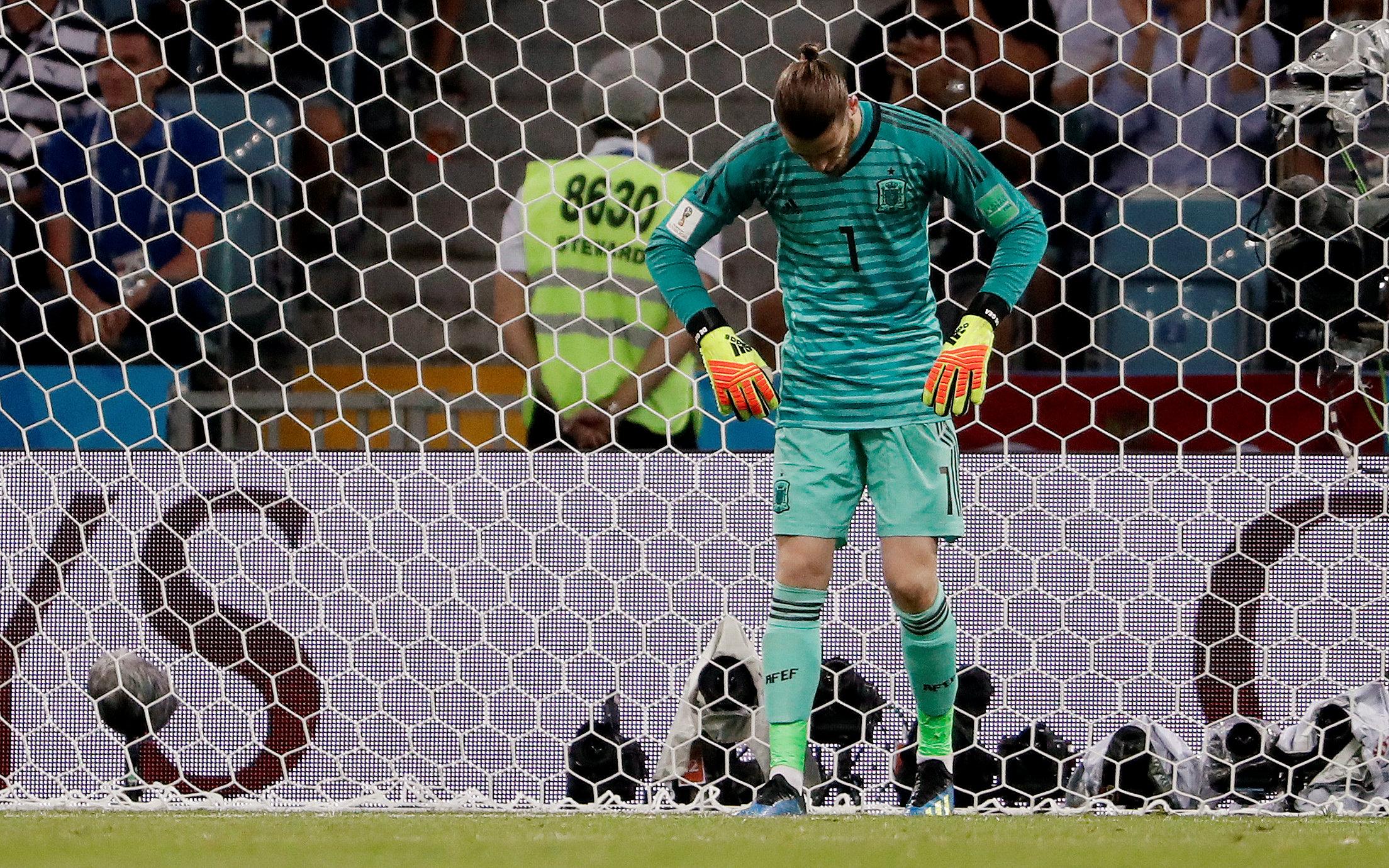Portugal vs Spain: Cristiano Ronaldo shows new side to his game in classic clash of World Cup styles
Ronaldo provided the catalyst for breaks by transforming hopeful long balls into counter-attacking opportunities with a successful series of neat headers, clever flicks and disguised passes

Your support helps us to tell the story
From reproductive rights to climate change to Big Tech, The Independent is on the ground when the story is developing. Whether it's investigating the financials of Elon Musk's pro-Trump PAC or producing our latest documentary, 'The A Word', which shines a light on the American women fighting for reproductive rights, we know how important it is to parse out the facts from the messaging.
At such a critical moment in US history, we need reporters on the ground. Your donation allows us to keep sending journalists to speak to both sides of the story.
The Independent is trusted by Americans across the entire political spectrum. And unlike many other quality news outlets, we choose not to lock Americans out of our reporting and analysis with paywalls. We believe quality journalism should be available to everyone, paid for by those who can afford it.
Your support makes all the difference.Formulate a checklist for the ideal World Cup encounter, and Portugal 3-3 Spain would tick every box: a historic rivalry, an early goal, a high tempo throughout, tremendous technical quality, both sides leading at various stages, a couple of stunning strikes, and a late twist. It was an aesthetically remarkable game, a consistently entertaining game, and also a strategically fascinating game, not because of formations or substitutions, but because Spain and Portugal attacked in entirely different ways.
Throughout the last decade there’s been an obvious clash of style in Spain vs Portugal battles, whether at international level, between club sides in the Champions League, or between Pep Guardiola and Jose Mourinho in rival dugouts. Spanish football is about controlled, patient possession play which frustrates, tires and then penetrates the opposition, whereas in response Portuguese football plays the reactive, transition-based counter-attacking role. That’s precisely how things played out in Socchi: Spain taking the game to Portugal, and Portugal attempting to hit Spain on the break.
We knew, of course, that Spain still excelled at tiki-taka, and their first-half performance recalled the dynamic Luis Aragones era, rather than the Vicente Del Bosque era when possession sometimes appeared a goal in itself, rather than a means to an end. Prompted by Portugal’s early opener and the requirement to chase the game, Spain worked the ball into dangerous positions constantly, particularly down the left.
Jordi Alba, amongst Spain’s most important players because he offers the speed, width and drive lacking from elsewhere, overlapped with tremendous energy, liberated by Isco’s well-timed drifts inside. Those two combined with Andres Iniesta’s slaloms from an inside-left midfield role, while Diego Costa prowled the inside-left channel and David Silva typically drifted inside from the opposition flank. Spain played in a confined space yet rarely found themselves crowded out, such was the intricacy and fluency of their possession play.
What we didn’t know was whether Portugal were still capable of playing on the counter-attack. This is now a technical side packed with ball-playing midfielders, and more pertinently, Cristiano Ronaldo is no longer such a pure counter-attacking weapon, having gradually transformed himself into more of a penalty box prowler. What this game demonstrated, however, was yet another different element to Ronaldo’s game, as he provided the catalyst for breaks by transforming hopeful long balls into counter-attacking opportunities with a successful series of neat headers, clever flicks and disguised passes.

Gonçalo Guedes, deployed alongside Ronaldo, should twice have made more of his old-school skill and newfound selflessness. Whereas once Ronaldo liked playing off a ‘big man’ because he provided the running, now Ronaldo needs a smaller man who will do his running. It appears a promising partnership, though, and Ronaldo was also heavily involved in build-up play during the first half, dropping deep into midfield – the winger-turned-striker now showcasing his abilities as a false nine, and giving Spain a taste of their own medicine. This was amongst Ronaldo’s best all-round performances of recent years, even putting aside the goals.
Yet you can’t put aside the goals, because this match was all about goals. Previous Spain vs Portugal clashes have been tight, tense and tactical: Portugal 1-0 Spain in Euro 2004, Spain 1-0 Portugal at World Cup 2010, and Spain 0-0 Portugal at Euro 2012, with Spain advancing on penalties. Ahead of this game, it seemed likely that one goal would be enough.

In the end, three wasn’t enough. Amongst the fantastic clash of styles there were moments of magic, moments of madness and six illogical goals. Portugal’s opener was ironic because it involved Ronaldo being fouled by Nacho, who had probably been selected ahead of other right-back options for his Real Madrid know-how on how to stop Ronaldo. Spain’s equaliser came from an entirely uncharacteristic Sergio Busquets long pass, and Portugal’s second from an equally atypical David De Gea error. Costa converting Busquets’ knock-down from a set-piece was hardly classic Spain and Nacho’s long-range stunner came from an entirely unexpected source.
Even Ronaldo’s late free-kick winner – which probably felt inevitable to the man himself, a scene that recalled the climax of Nike’s famous World Cup advert eight years ago – was actually his first free-kick goal from 45 attempts at major tournament. In all, it was the perfect footballing encounter, the ideal balance between teamwork and individualism: strategy provided the structure, but superstars determined the scoreline.
Join our commenting forum
Join thought-provoking conversations, follow other Independent readers and see their replies
Comments